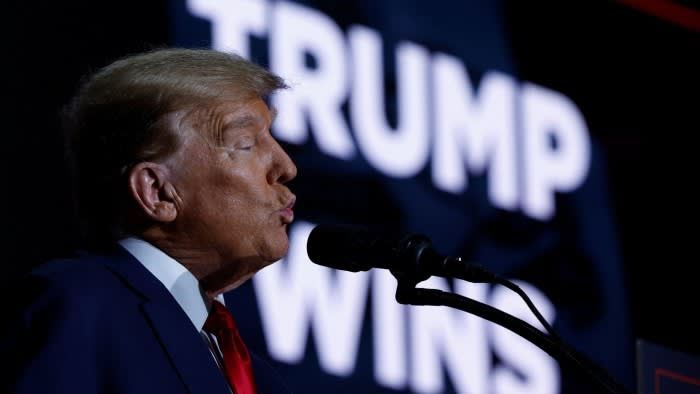Iowa rarely predicts a winner but Donald Trump may be the exception

Gain free access to the Editor's Digest.
Every week, Roula Khalaf, who is the Editor of the FT, picks out the stories that she likes the most for her readers in this newsletter.
There are a couple of different ways to look at how Donald Trump won in Iowa. Personally, I believe that it shows that he has an unusual level of control over the Republican party, more than anyone else ever has. Of course, this is something we've been aware of for a while now. It seems pretty likely at this point that he will be the Republican nominee in the upcoming election.
Another possible explanation that cannot be ignored is that Iowa is an unusual state that doesn't necessarily indicate anything. This state located in the Midwest is often unsuccessful at forecasting the outcomes of other primary elections. If we take a brief look at its past, we can understand why: in almost 50 years, it has only been able to correctly predict the final nominee for the Democratic or Republican party on six occasions.
In the past few elections, Iowa has not had much success in predicting Republican winners. The last time they did was back in 2000. Instead, winning the state's caucuses seems to lead politicians to a career in television. Two recent examples are Rick Santorum, a former Pennsylvania senator who won in 2012, and Mike Huckabee, Arkansas governor who won in 2008. Senator Ted Cruz, who won in 2016, continues to serve in Congress, but he also often appears on Fox News.
The aforementioned trio of names had an innate appeal to the predominantly evangelical Christian voting population in the state. However, their performance in the subsequent week's elections held in New Hampshire was considerably subpar due to religion playing a relatively insignificant role in the voting process in that area.
The situation is not looking good for the Governor of Florida, Ron DeSantis. He visited all 99 counties, but on Monday's election, he got a very low percentage of the votes, coming in second place. This is particularly disappointing because he had the support of the so-called "values-based voter" in the state and put a lot of effort into his campaign. It's unlikely that he will do much better in New Hampshire, so it wouldn't be surprising if he decides to drop out of the race soon.
Nikki Haley didn't have a terrible night because her campaign wasn't counting on winning in Iowa. Her real challenge will be in New Hampshire, where she has invested the majority of her resources. If Haley doesn't secure a solid second place behind Trump, her highly anticipated victory in South Carolina the next month might end up being disappointing.
It will be intriguing to see if she decides to confront Trump directly in the coming days, which will test her intentions. During her speech on Monday night, she hinted at a potential attack on the current president. However, if she continues with a half-hearted approach, it could indicate that she is considering the possibility of being Trump's potential vice president.
Haley comes from an immigrant family and grew up in a South Carolina town. Because of her upbringing, she's strong and able to handle difficult political situations. However, she often avoids attacking Trump's personality. When asked a question about the Civil War and its link to slavery, Haley chose not to answer, revealing her reluctance to upset Maga Republicans.
On Monday night, Trump faced a slight drawback: the turnout was not as high as expected. This is most likely due to his supporters being mostly rural, and the extreme cold weather with a wind-chill factor of minus 30C. However, this lack of enthusiasm shows that even the most devoted fans have their limits.
Although it remains to be seen whether Iowa's results are truly indicative of the future, Trump's lead was impressively large. He managed to win the caucuses with a majority of roughly 30%, which surpasses the previous record held by George W. Bush of 11% in 2000. Trump's victory seems to indicate that he is well on his way to securing the nomination, but the question remains as to whether Haley's aggressive stance during Monday night's debate is a sign that she's ready to take the fight to Trump.



































































